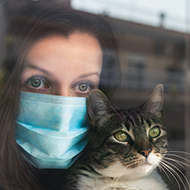Report highlights impact of COVID-19 on companion animal welfare

The report calls on the animal health community to encourage people to contact their vet with any new pet health concerns.
A new report highlighting the impact of COVID-19 on the welfare of pets has been published by the National Office for Animal Health (NOAH).
The report, 'COVID-19 and Companion Animal Health & Welfare: Impact and Considerations for the UK' looks at the impact of COVID-19 on the availability of veterinary services, and the impact this could have on companion animal welfare.
In the report, NOAH makes suggests several actions that Government, academia and pets owners can take to mitigate the ongoing impact of the crisis. Among these include:
- encouraging people to contact their vet with any new pet health concerns
- encouraging pet owners to continue with routine treatments (such as parasite control)
- encouraging the veterinary sector to develop new working practices to meet the requirements of the 'new normal'.
The report also calls on the animal health community to monitor and research the impact of the pandemic on pet health and welfare. In turn, this would help the industry understand the full impact of reduced consultations on timely diagnosis, and the treatment of conditions that are potentially life-limiting or associated with poor welfare.
NOAH Chief Executive Dawn Howard commented: “Even as lockdown measures have started to be eased, the COVID-19 crisis still continues to have an impact on how companion animal veterinary care can take place. It has brought into sharp focus the need to support responsible pet ownership by helping to enable safe access to veterinary services and the need to continue to monitor any impact on animal health and welfare.
“We are calling on the animal health community to work together to raise awareness: to help pet owners more fully understand their pets’ needs and to support them and the veterinary profession in addressing them safely at this challenging time.
“We believe there is also a Governmental responsibility to act, with the need for a Government minister to have responsibility for both pet health and welfare,” she said.



 The Veterinary Medicines Directorate (VMD) is inviting applications from veterinary students to attend a one-week extramural studies (EMS) placement in July 2026.
The Veterinary Medicines Directorate (VMD) is inviting applications from veterinary students to attend a one-week extramural studies (EMS) placement in July 2026.